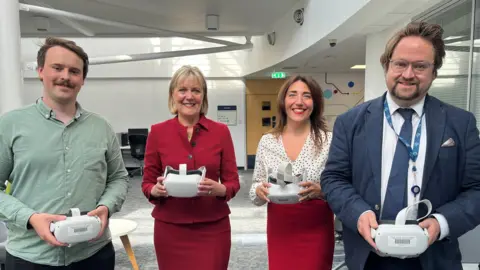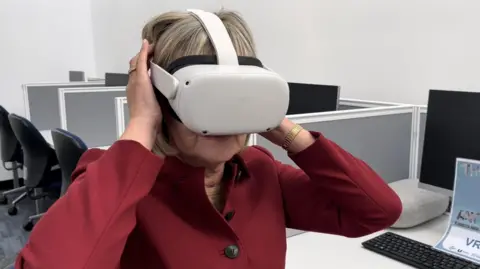Virtual reality used to understand domestic abuse
 BBC
BBCVirtual reality technology is being used to help judges and staff working in domestic abuse cases better understand victims' experiences.
Police and Crime Commissioners (PCCs) from Cleveland, Durham and Northumbria forces have teamed up with Teesside University to develop an educational film for those working in family courts.
Using virtual reality, Through the Eyes of Another immerses the viewer in the journey of an abusive relationship.
Durham PCC Joy Allen hopes the resource will be rolled out across the whole UK.
Ms Allen described the idea as "radical, informative and innovative" and said the three PCCs were approached by a member of the judiciary who wanted to transform the court process.
"For me, it's about the judgements and about the experience... when you're making those deliberations, having an understanding of what you're doing and also what's informed those things as well," she said.

The film follows a survivor from the early stages of their relationship to coming face to face with their abuser in court.
It has been put together using testimonies from victims of domestic abuse and has been endorsed by Baroness Brenda Hale, former president of the Supreme Court of the United Kingdom.
The film was produced by TUCAN studios at Teesside University.
Jack Fahey, senior creative producer at the studios, explained how the video helped show the viewer how domestic abuse could escalate.
"You see the kind of subtleties and nuances of it from early stages, where it's just a little comment, and then you see that kind of evolve worse and worse," he said.
Ms Allen said the resource could help staff working in the family court truly understand where victims were coming from throughout the process.
"[The process] can be a bit cold, because you get a file, you get a case," she said.
"These are human beings with human experiences, and I think this gives us a real innovative snapshot of the times in peoples lives."
Follow BBC Tees on X, Facebook, Nextdoor and Instagram, external. Send your story ideas to [email protected].
